Banking royal commission live: Bankwest under the spotlight as farmer calls on banks to be a bit more forgiving
Live coverage of rural lending hearings: the commission will reconvene at 9.30am tomorrow with Bankwest in the stand.
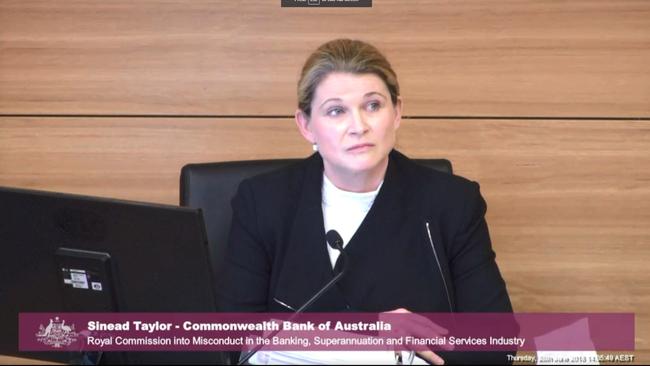
Welcome to day four of the rural lending hearings in this fourth round of the financial services royal commission. The week began with commissioner Kenneth Hayne pushing back against ‘misconceptions’ about hearings to date and pushing back hearings on natural disaster insurance. After that senior counsel assisting Rowena Orr QC outlined the ground to be covered over the coming week of hearings before extended questioning of ANZ’s head of corporate lending services, Benjamin Steinberg, about the banks acquisition of Landmark’s loan book. After that Tasmanian Farmer Michael Hirst gave emotional testimony and Queensland cattle farmer Wendy Brauer detailed her family’s dealings with Rabobank and then Rabobank regional manager Bradley James took the stand to answer questions about the bank’s incentives for lending and valuation processes. Mr James was back in the hot seat this morning and conceded the bank had breached the banking code and not met community standards and expectations. The commission has now moved on to the next case study involving Queensland farmer Mel Ruddy’s dealings with Bankwest. Bankwest representative Sinead Taylor is currently in the stand.
4.17pm: Commission breaks for the day, back at 9.30am tomorrow
A bit of bank and forth over whether to try and complete Ms Taylor’s questioning today after CBA’s counsel requests reconsideration but after Ms Orr says at least another hour will be needed Commissioner Hayne decides to pause proceedings. The hearings will continue at 9.30am (AEST) tomorrow.
3.56pm: Orr notes only three FOS complaints going in favour of customers over 10 years
Rowena Orr said that over a ten-year period, only three FOS complaints against Bankwest reached recommendation in favour of the customer.
3.45pm: Taylor says FOS not deliberately shielded from valutation issues
Ms Taylor says she doesn’t believe Bankwest deliberately kept information from FOS in relation to problems with the valuations done on the Ruddys’ property, saying it was more likely that the person dealing with the complaint was probably unaware of issues with the valuations. Ms Taylor acknowledged that the person dealing with the complaint could have made enquiries to make themselves aware of the of the error.
3.43pm: Focus turns towards FOS complaint
Rowena Orr asks Ms Taylor about internal Bankwest documents relating to how bank employees should deal with FOS complaints.
3.38pm: Emails suggest additional credit was given to help pay for valuations
After initially saying the Ruddys’ had been given an additional overdraft on their account to support them financially, Ms Taylor said an email chain made it look like the Ruddys’ had been given additional credit to pay for a $6000 in property valuations.
3.19pm: Some of the issues with valuation identified, size still not on radar
Next we move on to an email chain from Paul Neilson, senior manager business credit, to Belinda King, the Ruddys’ bank manager at the time. From May 2012. Under valuations and insurance there are errors under the valuation
The issues with the date on the valuations of Arronfield and Sunrise were noted. Mr Neilson asked for the value attributed to the Sunrise property to be reduced.
Mr Neilson still hadn’t worked out the error with the valuation on the size of the property and says the bank should wait to do another valuation in August 2012.
3.06pm: Some of guarantees signed by the Ruddys were not dated
We’re on to the guarantees that the Ruddys’ son gave on the property. Their son executed the guarantees contained in the letters of offer about a month before the Ruddys executed the letters of offer. Was that standard Bankwest practice? I’m not aware of that being standard Bankwest practice.
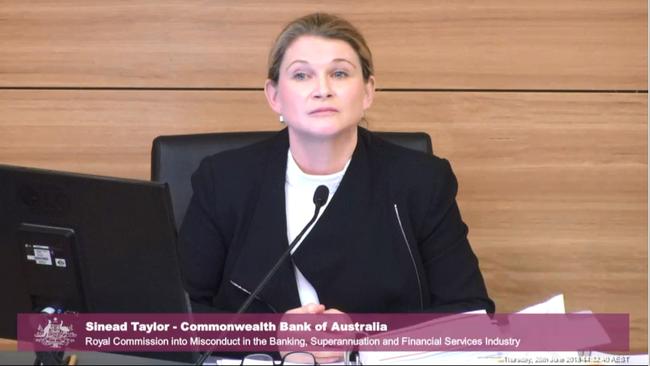
As well as the guarantees, Bankwest also asked him to execute separate guarantees. None of those guarantees was dated. Was that standard practice? No. Was that acceptable? No
The bank manager was permitted to value properties up to $5m. There was no need for the valuation to be signed off - but the credit officer was required to sign off on the valuation.
At the time there was also no requirement for the person valuing the property to do a site inspection, we hear.
The valuations were done in October 2011, after the Ruddys had signed the letters of offer from the bank. Just a reminder - Arronfield was valued at $1.1m and Sunrise at $1.2m. Ms Taylor points out that funding would have been held off until the valuations had taken place.
3.13pm: Taylor can’t explain major issues with Sunrise valuation
Moving to the valuation report prepared for Sunrise. It is signed by the bank manager and is dated August 1, 2012. The bank manager left the bank in March 2012. So something’s wrong there. Ms Taylor can’t offer any explanation. The same with Arronfield’s valuation.
For the Sunrise valuation, the size of the property is listed at 72ha. Three comparable properties are listed, all much larger plots of land than Sunrise.
We see the basis of the Sunrise valuation was that it was 896ha in size. You accept the valuation is wrong? I accept the calculations are incorrect.
You accept that in getting this valuation wrong Bankwest’s conduct fell below the community standards and expectations? Yes
Orr: “This valuation took the Ruddys away from their course to sell Sunrise and instead to a strategy of holding Sunrise and borrowing more money. Do you accept that?”
Taylor: Yes.
Orr: And it was wrong?
Taylor: Yes.
Orr: Bankwest didnt tell Mr Ruddy?
Taylor No.
Orr: And should they?
Taylor: Yes.
2.58pm: Taylor concedes bank breached act by not informing Ruddys about valuation issues
“Would it have assisted Mr Ruddy to understand that the valuations may have been unfair?”
“Yes all the customers should have been told.”
“And you accept that that was a breach of the act?”
“Yes I do.”
We hear that the bank took no action against the bank manager.
2.56pm: Bankwest review led bank to believe manager had been inflating valuations
The bank managers conduct led to reviews of his loan portfolio.
So it was known to Bankwest by early 2012 that he had been inflating valuations. The bank estimated there had been 5 valuations at the time in which he had been the only valuer.
After the bank manager left the bank, Bankwest contacted all customers and told them he had resigned. They were provided with details of their new bank manager. They weren’t told that he was inflating valuations.
2.51pm: A spike in complaints about the manager in 2012
These issues were identified at the time of his departure. The bank also referenced improper misselling on his part but Ms Taylor can’t say what that refers to specifically.
He was also found to have been manipulating the banks systems to avoid behavioural checks being flagged.
He left in March 2012 and by May 2012 there were 15 separate customer complaints about the bank manager, we hear.
2.48pm: Bank manager leaves the bank under a cloud
The bank manager left the bank in March 2012. He was ineligible for a bonus that year due to his resignation. Ms Taylor says there were some issues with conduct that led to his exit. “An issue with valuations, discrepancies with some of the transactions he had undertaken and an issue with the transfer of a payment.” Ms Taylor tells the commission.
In more detail there were concerns that he had overstated valuations, there were discrepancies between the numbers on financial statements and what he had put into Bankwest’s system and the banker had represented that he was putting one customers money into their term deposit but instead he put it into another customers account.
2.46pm: Bankwest managers could potentially double their salary through bonuses in 2011
The bank manager’s base pay was $128,000. In 2010 his bonus was $15,000. In 2011 his bonus was $35,000. The max he could obtain each year was 57 per cent of his salary.
A spreadsheet shows instances in 2011 where bank employees could double their salary through the bonuses. Ms Taylor concedes she wasn’t aware this was possible.
A similar 2012 document showed that Bankwest had concerns whether its bonus scheme was enough of a motivator to stretch performance. The bank managers wanted more rewards, Ms Orr clarifies. Ms Taylor agrees with that assessment.
2.38pm: Manager feted with ‘rural champion’ award, wins trip to Hayman Island
The bank manager who dealt with the Ruddys met his expectations for the year, we hear.
Another document shows that the bank manager received an award as a “rural champion” for the 2010-2011 year for achieving sales of $33.5m, well above his $25m target.

His sales results would have been tempered by the results across the other KPI areas, Ms Taylor says. That’s why he was only given the rating of “meets expectations” that year.
This was the only overt recognition given by the bank at that time, Mr Hayne notes. No other recognitions were given for exceeding other KPIs, just sales targets.
2.33pm: Orr drills into Bankwest KPIs
On to his KPIs — his financial KPIs were asset and revenue growth. Ms Taylor agrees that for 2012 the KPIs were heavily weighted toward profitable growth.
The KPIs were divided into four categories: profitable growth, managing risk, customer satisfaction and people. Sixty per cent of the KPIs were associated with the profitable growth category.
Within profitable growth, asset sales targets accounted for 30pc of that KPI for the year, the commission hears. These KPIs helped to determine whether or not the bank manager received a bonus that year.
Currently the financial KPI at 40pc is still the highest proportion of all the KPIs, Ms Taylor says.
2.28pm: Ruddy manager brought other customers across from Rural Bank
Ms Orr asks Ms Taylor if the bank manager, who had previously worked at Rural Bank, brought across other customers to Bankwest. Ms Taylor thinks he moved across 5 or 6 customers.
2.24pm: Focus switches back to Ruddy case study
Ms Orr moves on to the Ruddys and their dealings with Bankwest.
She begins by looking at a credit risk submission put together by the first Bankwest bank manager that the Ruddys dealt with ahead of their move across to the bank in October 2011.
Under pricing approval the bank manager writes that the pricing proposed by the bank was aggressive so that Bankwest could win the business. Bankwest was aware the Ruddy’s had 3 separate facilities totalling more than $1m.
The values of Arronfield and Sunrise were included in the submission. Based on those values, Bankwest estimated the loan-to-value ratio (LVR) at 48.7pc. This was considered by Bankwest to be a low LVR. That was considered to be a strength of the loan, Ms Orr shows. Other strengths included Mr Ruddy’s “sound planning skills”.
2.15pm: There was a spike in FOS complaints in 2013/14
Ms Taylor details the events in 2013 that led to difficulties, such as floods and livestock issues, that affected the bank’s rural customers.
There was also a spike in customers transferred to the bank’s GCS arm that year — GCS is the group responsible for the banks “troublesome or impaired assets”. Ms Taylor says changes in policies to be in line with CBA’s (which owns Bankwest) policies at the time would have also contributed to the spike.
Complaints about the bank from rural customers to FOS also spiked in 2013 and 2014.
Ms Orr moves on to Bankwest’s decision to move out of rural locations on the east coast. Did the decision to centrally service the east coast customers contribute to any of the matters we just discussed, Ms Orr asks. “No I don’t believe so”, Ms Taylor says.
2.03pm: Bankwest representative takes the stand
We’re back from lunch and Bankwest executive Sinead Taylor is up on the stand.
Ms Orr begins by asking Ms Taylor about portions of her statement dealing with the high number of the bank’s farming customers facing difficulties in 2013 and spikes in its enforcement actions.

1.55pm: Rabobank concedes sales-based bonus policies ‘fall short’ of rules
Australia’s largest rural lender Rabobank has admitted it has policies that will “fall short” of rules designed to stop banker salaries being driven by sales targets, as required by the industry lobby group the Australian Banking Association.
Under questioning at the royal commission on Thursday, Rabobank regional manager Bradley James said the group’s bankers were “still incentivised to grow our business through loan sales”.
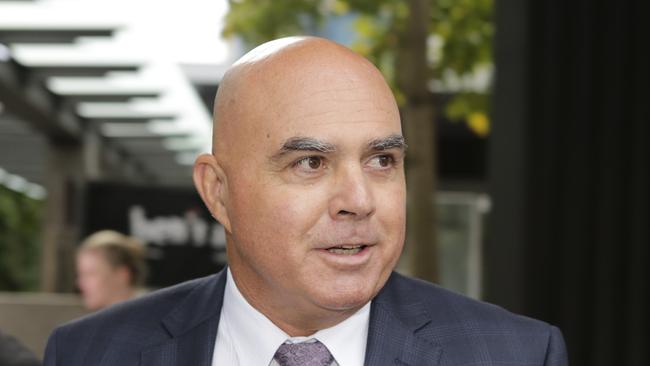
Last year, former head of the Australian Public Service Stephen Sedgwick called for banks to end the tie between what a banker sells and how much they are paid, among 21 recommendations stemming from a year-long inquiry. The Australian Banking Association told their member banks to adopt all the recommendations.
Counsel assisting Rowena Orr asked Mr James if Rabobank was not compliant with the Sedgwick recommendations considering that sales were still the “primary driver” of banker pay at the lender. Mr James agreed the bank was not compliant and he was unable to say what changes were going to be made to align the bank to the recommendations by the 2020 deadline. “The current system would fall short of that, I would suggest,” Mr James said
1.03pm: Ruddy excused, commission breaks for lunch
Mr Ruddy has been excused and the commission breaks for lunch.
Commissioner Hayne says the hearing will reconvene at 2pm (AEST).
1.01pm: Ruddy says he felt he had no choice but to sell Sunrise
In August 2016 they went to farm debt mediation. “It was a pretty stressful day. Something you’d rather not do.”
By the end of the day they reached an agreement to sell Sunrise within 6 months and pay Bankwest 75pc of the proceeds as well as pay an additional $400,000 to discharge the Arronfield debt.
“Did you feel you had a choice in agreeing to that proposal?” “That was the mediation, we had no choice.”
They sold Sunrise in April 2017 for $750,000. Bankwest received 75pc. The Ruddys borrowed another $160,000 from his mum and sold a dozer to make up the balance.
They have no facilities with Bankwest now and still have a cattle lease with BoQ.
Ms Orr asks how it has been not having a bank.
“It’s been extremely difficult. You need a bank to carry on and help you out … we’re selling cattle when they’re not ready and I’ve gone back to contracting.
They are steadily getting back on their feet, Mr Ruddy says. “You need a bank to be a little bit more forgiving and help you ride it out.”
12.58pm: Ruddys reject FOS recommendations
It also found Bankwest was entitled to take recovery action.
The Ruddys rejected the recommendation and the dispute moved on to a formal determination by the ombudsman in which the same findings were essentially adopted bar some changes on the interest Bankwest charged. The Ruddys rejected the determination. Had they accepted the determinations Bankwest would have been required to reduce the overdraft balance and credit their account by $2000.
12.55pm: Ruddy begin FOS proceedings after Bankwest offers mediation
During 2014 the Ruddys were in touch with Bankwest about their facilities. In October the bank told them if they didn’t reduce their debt it would offer farm debt mediation before taking action to enforce its securities.
They got in touch with someone who helped them lodge a dispute with FOS. In August 2015 FOS put in a recommendation partly in the Ruddys favour and partly in the bank’s favour.
Ms Orr brings up the recommendation. It says Bankwest had overvalued Sunrise in October 2011 but “this did not render the lending inappropriate”. It also said the case manager found “given the flawed September 2011 valuation for the property Bankwest should not have relied on the 2013 valuation to require you to make a principle reduction to debt and to sell the properties.” The ombudsman recommended they be paid $2000 compensation.
12.52pm: Bankwest wanted them to sell Sunrise
The bank asked them to make a $50,000 debt reduction by the end of 2013 and asked them to sell Sunrise. “I thought we had no option. We were in a bit of a corner”
They put Sunrise on the market for $900,000.
At the end of the year, Nikki Adamson from Bankwest called to say she was in charge of his file. The file had been moved to group credit structuring within Bankwest.
Ms Adamson told them their price on Sunrise was a bit unrealistic and they should bring the price down. “I suppose I thought it was worth more than it was” he says.
They had interest in Sunrise “but couldn’t get it over the line”.
12.47pm: Lower valuations result in call to sell a property
The valuations — $750,000 and $900,000 — meant Bankwest said he would have to sell one of the places. “I wasn’t very happy about it. In the middle of a cattle slump, a drought” you’re not going to get what it’s worth.
12.46pm: Ruddy says paying for valuation means he couldn’t buy ‘lick’
The Ruddy’s lost 80 head of cattle as a result of not having the money to get the right feed for them. “It was a struggle” to pay the bills he said.
12.43pm: Ruddy turns to home brewing after properties revalued
In May 2013 Bankwest talked to the Ruddys about doing another valuation on their properties.
“They said they thought the property had gone down in value and they were entitled to call for another valuation and I’d have to pay for it” Mr Ruddy said. The bank said the Ruddys would have to pay $6,600 for the valuation. “I wasn’t happy about that.”
Before the valuations in May 2013, Bankwest sent a letter saying they were going to increase their facilities. The valuations were done, the Ruddys were charged immediately. “The money came straight out of our bank account and I couldn’t pay my bills … that’s when I started home brewing. I’m quite good at it now.”
12.40pm: Ruddy surprised to learn original bank manager had left Bankwest
In 2012 they were told their bank manager wasn’t going to be their manager any more. He was “amazed”. “I was looking for a long-term relationship, I was quite surprised.” The new bank manager was Belinda King.
The following year, 2013, things got progressively worse. Due to live export ban in 2012, cattle prices slumped in 2013. They went from floods to no rain in 2012 and 2013. “They were pretty tough years.”
Bankwest closed Mr Ruddys branch, opened another one for a few months, closed that one and opened another one in Brisbane. He had 3 bank managers in that period. “It was confusing … I’m used to having a manager who comes out to see me”. None of the managers visited Mr Ruddy on the farm.
12.35pm: Ruddy struggled to make the interest repayments found facilities confusing
Having moved across to Bankwest, Mr Ruddy also took out stock facilities with BoQ.
In the first year after moving to Bankwest Mr Ruddy said the facilities rolled over and instead of paying interest every month, then every two months. “It was different and a bit confusing … you have to make interest payments all the time. It was a bit difficult”.
They struggled to make the interest repayments, Mr Ruddy said.
In 2012, Mr Ruddy “got a bit crook and was in ICU for a little while”. He was off work for a month. In that year they were starting to get the breeding cattle numbers up. They increased their overdraft to help cover the interest while they were waiting for the cattle numbers to rise.
12.32pm: Ruddys receive letters of offer from Bankwest
In late 2011 the Ruddys received the letters of offer from Bankwest.
Ms Orr brings up the first letter which shows Bankwest offered the Ruddys a commercial advance facility with a limit of $695,000. The bank also offered them a $100,000 overdraft.
The second letter of offer shows the bank also offered a commercial advance facility in just
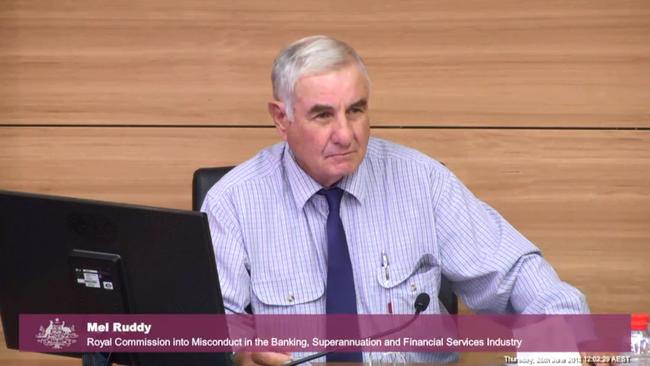
Mr Ruddys name for $325,000. The letters also contained guarantees and the guarantee of this second letter was provided by Mel Ruddy’s wife.
The bank manager didn’t really explain the terms of the document, Mr Ruddy told Ms Orr.
Mr Ruddy was told he wouldn’t need another valuation until August 2014 and he thought the facility would run until then. That’s how long it would take the breeding model up and running. He thought the bank manager would do the valuation in 2014. “He seemed like a good guy and knew his cattle”.
The Ruddys signed the letters but didn’t give them a careful read. His son also signed a guarantee that they thought was just his quarter share of Arronfield. They later found out that wasn’t the case.
Valuations were carried out: the values were $1.2m for Sunrise and $1.1m for Arronfield.
Michael Roddan 12.30pm: Calls for more digging into fire sales
Momentum is growing to expand the royal commission, or launch a further inquiry, into receivers appointed to conduct fire sales of the farmland and livestock of distressed agricultural borrowers, after a series of Senators slammed the conduct revealed in the latest hearings for Kenneth Hayne’s investigation.
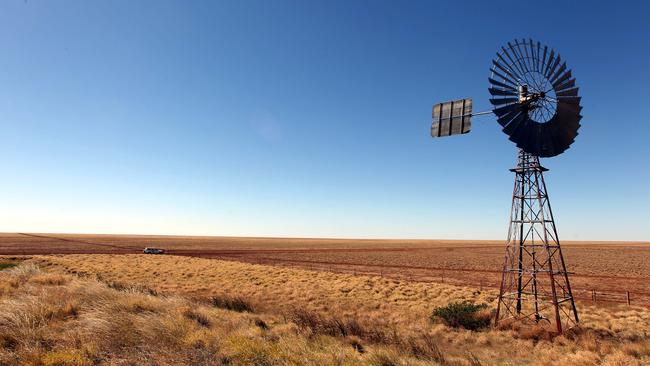
Last night a number of Senators agreed that the further investigation of the external administrators play in the financial sector was needed, after Katter Australian Party senator Fraser Anning raised concerns the royal commission was suffering from “issues in relation to time, funding and lack of political will”.
“The intent of the royal commission was to address the unconscionable banking practices within the finance sector. In the current form, it is restricted in its ability to do this,” Mr Anning said.
12.25pm: Ruddy opted to move to Bankwest, not sell Sunrise and borrow more money
The plan developed from selling Sunrise to holding on to it and putting money into developing Arronfield. Mr Ruddy thought the numbers stacked up and it made sense. The bank manager said the interest rates would be better and fees cheaper.
The bank manager said there wouldn’t be a problem with Ruddy’s son guaranteeing just his share of the farm. They decided to move to Bankwest, not sell Sunrise and borrow more money.
“If you hadn't had that meeting what would you have done,” Ms Orr asks. “We’d have sold Sunrise and would have reduced our debt. Bankwest offered us such a good deal and me being such an optimist I thought we’d give that a go.”
12.23pm: Bankwest offers to value the two properties
They got another call from the Bankwest manager at the time. He said he would value both properties at the bank’s expense. He met with the bank manager in August 2011. The bank manager talked to him about values of properties in the area. He estimated the two properties (Sunrise and Arronfield) were worth well over $2m at that stage.
He said Bankwest could lend them 60pc of the valuation on the two places. The valuation came back at $2.3m.
He wanted to move from a trading model to a breeding model with cattle and told the bank manager it would take three years to get that model up and running.
He told the bank manager about a $50,000 loan he had with BoQ. They discussed what would happen if things went wrong and the bank manager said there was “plenty of equity to draw on … to ride it out” if they had a few tough years.
12.20pm: ‘A real wet year’
Mr Ruddy then had a meeting with Mr Baisley and the bank manager. They discussed selling Sunrise. The two men talked to Mr Ruddy about the cattle market, saying he should consolidate assets. They told him they could get him a better rate at Bankwest. They said he would need to pay for a valuation. He said he wouldn’t do that. “I never paid for a valuation and never will,” he told them. He decided not to refinance.
In 2011 they had “a real wet year”. All that rain affected the grass and cattle. In mid 2011 he had an annual review with Rural Bank. There was a discussion about selling Sunrise. The rural bank manager said it would be a good time to sell Sunrise and consolidate some of their debt.
12.16pm: Bank manager switched from Rural Bank to Bankwest
After a few years the Ruddys refinanced in 2007. They thought an interest only loan with Rural Bank would allow them to put more money into developing. They increased their debt to buy more cattle and equipment. One of his bank managers was Ian Baisley. He left Rural Bank and went to Bankwest in 2009 or 2010, Mr Ruddy says. At this time the Ruddys started thinking about selling Sunrise. In August 2010 Mr Baisley called them and suggested that Bankwest could give them a better deal. He said he could bring a manager out to meet with them (his name is subject to a non-publication order).
12.10pm: Queensland farmer Mel Ruddy takes the stand
We’ve moved on to a case study, Melville Ruddy, a farmer from Cooladdi in Queensland. In the 1980s the Ruddys purchased a farm, Sunrise, 30km north west of Toowoomba. They borrowed money to purchase the farm in 1985. By the 1990s they were travelling okay and Mr Ruddy was doing a bit of off-farm work.
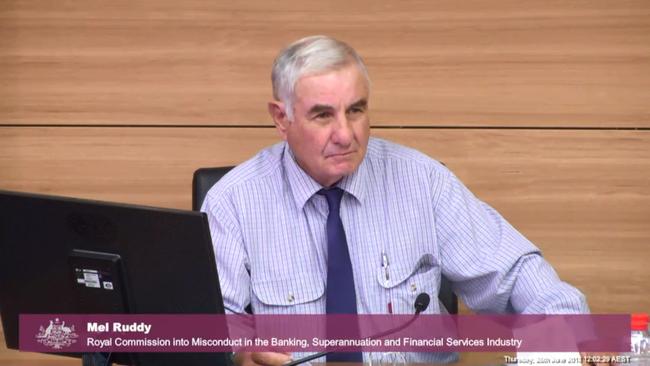
He saw increases in property values in the early 2000s and in 2004 they bought a farm called Arronfield. They found out the property was available through an agent in Charleville. They bought the farm with one of his sons. So he and his son were both on the title. His son owns a quarter of the property. The purchase price was $465,000. His son put up $100,000 and he borrowed the rest from NAB ($650,000 — The mortgage of Sunrise as well as Arronfield). The value of Sunrise at the time was about $600,000. His son gave a guarantee to NAB over his quarter share of the Arronfield purchase.
11.54am: Rabobank rep expresses regret over how Brauer case unfolded
The commission has located the performance review document but Ms Orr decides not to ask any questions about it.
Counsel for Rabobank, Mr Anthony McGrath SC, asks a couple of questions on the lending ratio guidelines at the time when the Jamberoo assessment was made.
Mr James then expresses his regret to the Brauers at how the matter unfolded and wishes them well. Mr James is excused.
11.36am: Commissioner puts it to Rabobank representative that communication not the issue
Mr Hayne asks Mr James a few questions. Did Rabobank ever record in its files a conclusion that the initial proposal was serviceable? No. Therefore does it follow that the bank never recorded how the initial proposal would have been serviceable? That’s correct.
I wonder whether that may be at the heart of this matter rather than wanton communication between banker and customer. I believe communication would not have become central to the issue had the loan been assessed properly in the first place.
The hearing takes a short break to see if they can locate and go through the original bank manager’s performance review. Mr James may have more questions to answer. Hearing to resume at 11.45am (AEST).
11.33am: Rabobank shifted its position on conceding misconduct and breaches
Rabobank markets itself as a socially responsible bank, Ms Orr states. Did the bank’s employees act consistently with this in their experience with the Brauers? Their intention was consistent with it but the execution may not have been, Mr James says.
Ms Orr moves on to her opening statement in which she mentioned Rabobank’s submissions in which it made no mention of misconduct or conduct falling below community standards.
We hear that late on Monday the bank’s lawyers said it had conceded its misconduct and conduct falling below community standards. It was only once the commission investigated the case that the bank made these admissions of misconduct and conduct falling below community standards.
Rabobank has made those admissions reluctantly, Ms Orr argues. I don’t accept that notion, Mr James says. He says he only picked up the file three weeks ago and prior to that he didn’t know the extent to which the case played out.
Will Rabobank remediate the Brauers? I haven’t considered that, Mr James says. I think its something that should be done without the public gaze … something we will quietly consider.
11.28am: James concedes original manager’s conduct was unacceptable
The outcome of the debt mediation was that the Brauers would sell Jamberoo for not less than $2m and they would repay the entire $4m.
Why did the bank push them to repay the full $4m rather than the $3m the mediation was subject to. To get the debt to a manageable level, Mr James says. But repaying $4m would be getting rid of the debt completely.
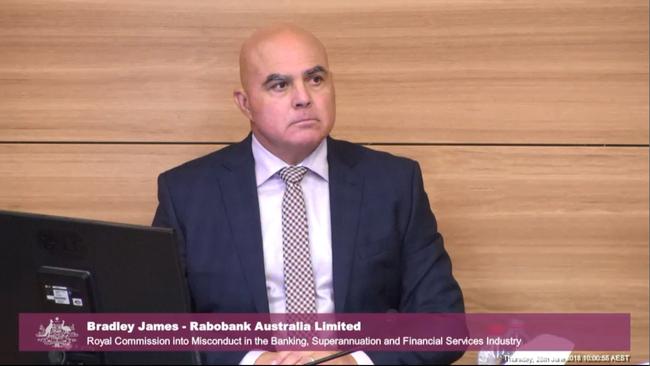
Did the bank want to get the Brauers off the books? That’s the inference from that but nothing from this indicated that we didn’t want to deal with the Brauers.
The Brauers incurred a capital loss of half a million from the sale of Jamberoo.
And the bank manager’s conduct was unacceptable in initiating the sale of Jamberoo to them, Ms Orr puts to Mr James. “I hadn’t considered that wording but when I fully reflect on this, I think it was,” he responds.
11.21am: Bank refused to reveal documents during mediation
We’ve moved on to the mediation between the bank and the Brauers. The Brauers’ lawyer asked to see documents and information related to the loan but the bank refused to hand them over.
Mr James agrees again that the bank’s conduct in this instance fell below community standards and expectations and it could have constituted misconduct.
Mr James says the bank should have delayed mediation but that a delay was also an option available to the Brauers. Why would they want to delay, Ms Brauers asks. Mr James struggles to answer that one.
Mr Hayne steps in and asks what should the bank have done when it went into the mediation knowing that the Brauers’ lawyers had asked questions that the bank itself had asked previously in relation to the case.
“Our view of the mediation was a resolution going forward, not a forensic of what had happened in the past,” Mr James said.
Is it any part of the mediation process for the bank to understand where the customer is coming from, Mr Hayne asks. Is that important or relevant?
“To go forward we have to consider the past, Mr James responds. We are trying to resolve going forward and in doing so we should also consider what’s led to the circumstances.”
11.15am: Bank expected the Brauers to repay the $3m that month
We hear how in mid-2013 the bank started to think about transferring their account into asset management.
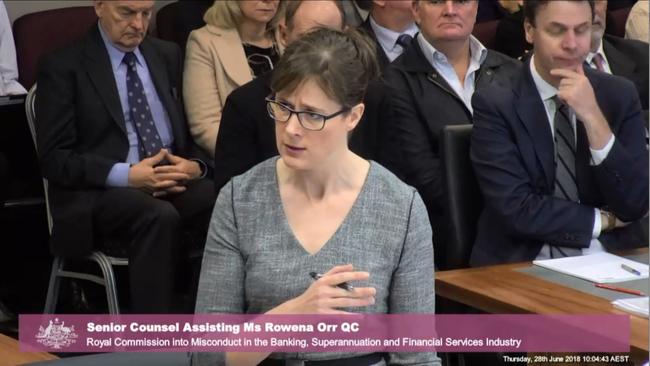
Mr Brady and a Mr Ole from asset management visited the Brauers in June 2013 and reiterated that the bank expected them to repay the $3m that month.
In a file note Mr Brady made of the visit, he wrote that Mr Brauer raised concerns regarding why the loan was given. When the Brauers didn’t repay the loan they were charged default interest on it.
11.07am: The Brauers get a new manager
Back to the Brauers and Mr Greg Brady, who became their relationship manager in June 2011 after their bank manager left to go to another branch.
The Brauers asked for the funds they were promised and Mr Brady requested they provide further financial information. The information was provided and Mr Brady concluded that substantial asset sales would be required by them to repay the $3m if they wanted to draw down the additional $300,000 earlier agreed on. He told them this.
Mr Brady submitted a new credit submission detailing $3m would need to be repaid by 2013.
Mr James accepts that the bank’s actions here could constitute a breach of the code of banking practice. He didn’t originally agree with this in his submission but he has changed his view after reviewing the file.
11.04am: Original manager resigns partly due to not meeting sales targets
Moving on and Ms Orr goes into detail on the bank manager’s KPIs, which included a target of additional lending each year of $15m. Aside from in exceptional circumstances, would a bank manager be granted a bonus when they didn’t meet their sales targets, Ms Orr asks. Potentially, Mr James says.
In cases of a junior manager, a manager who may have been ill or who had just commenced in the role, he says, the sales KPI may not have to be met.
The retail banking remuneration review released last year recommended banks implement changes by 2020 including removing incentives directly related to sales targets.
Rabobank’s approach is not yet consistent with the recommendations of the review, Ms Orr says. “I hadn’t considered that,” Mr James says. He says he believes there’s a balance within their discretionary system.
Ms Orr pushes him on the point to agree with her. He eventually does. He says he doesn't know what changes are being put in place before 2020 but that the current system falls short of the recommendations.
10.51am: Rabobank says it mixed up performance review
We’ve just heard that the performance improvement plan of the relevant bank manager may not even be the right one
The bank has given the commission the wrong performance improvement plan. Mr James is attempting to explain why this happened — even though it bears the name of the bank manager.
10.50am: ‘It should have been reviewed’
We’re on to how the bank provided the additional $300,000 to the Brauers as originally agreed but only on the condition they repay $3m within two years. Was that “taking a relaxed attitude” Ms Orr asks. I don’t have an opinion on whether that’s relaxed or not, I’m sorry, Mr James replies.
Shouldn’t Rabobank have considered whether the terms of the facility should have been altered until they were back on their feet? It should have been reviewed, Mr James says, but he can see no evidence of that.
What happened to the bank manager? He resigned, Mr James says.
He was being counselled by the bank on his KPIs. The bank came to the conclusion he wasn’t performing. He wasn’t meeting his lending target KPIs, we hear.
In 2013 he went on a performance improvement plan.
10.43am: It’s clear there were cashflow issues from the beginning
The cashflow difficulties became obvious very quickly, we hear.
Ms Brauer, in an email to the bank in September, said they didn’t have enough funds to cover the interest a month after the new facility was put in place.
It’s clear there were cashflow issues from the beginning. They were entirely dependent on lease payments to service the loan. Did Rabobank take any steps at this point.
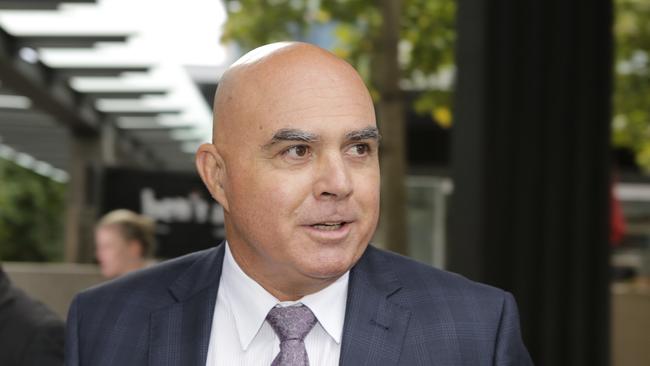
Mr James says he would hope there was an investigation done on the case at the time but he can’t say whether one was completed.
The following January there was severe flooding in the area and the Kia-Ora leasee said they were not going to continue the lease as a result of the floods.
In an email from the Brauers to the bank, it’s clear that their difficulties were due at least in part due to a natural disaster. Mr James says an email from the bank pointed out government assistance that they may be able to avail of due to the natural disaster.
Another email that Ms Orr takes us to shows the bank manager says he is sorry to hear of the lease. “Stay in touch and we’ll work out some sort of strategy” he said. The bank was taking a relaxed approach due to the flooding, he added.
10.36am: ‘It became very confusing over that period’
Even fully drawing on the full facility the Brauers had to find another $62,000 to fund the settlement of the Jamberoo purchase.
In an email Mrs Brauer says: I transferred 50k from the farm deposit, will this be enough to cover everything. I thought we were only short $27,000 … I’m confused.”
So she was labouring under the misconception that fully drawing on the $1m facility before it had been refinanced was what had been agreed to. Mr James agrees with Ms Orr.
The bank manager then replied to the Brauers saying “sorry, probably didn’t explain that properly.”
“Yes, it became very confusing over that period,” Mr James says.
The only way the Jamberoo could settle was if the Brauers sourced additional funds. Was that an acceptable outcome? No, Mr James agrees.
From the time the property settled, even if everything had gone to plan, the prospect of the Brauers servicing the new facility was virtually nil.
Mr James says he needs to break it down but no it would not have stood as an economic proposition.
Having fully drawn down the $3.7m facility and having already used the farm deposits it was obvious there were going to be cashflow issues, Ms Orr says. Yes, Mr James agrees.
10.27am: Manager incorrectly told the Brauers they had $103,000 available
Ms Orr and Mr James are discussing the Brauers $1m facility that was refinanced to an $800,000 facility.
Is it the case that the $1m facility wasn’t paid out but was available for their use and therefore accrued interest. Yes, Mr James replies.
Given there was delay in the settlement it was reasonable for them to use the funds from the $1m facility. Yes, he agrees.
You’ve refinanced the $1m facility to an 800k facility but you’ve continued to allow them to use it as a $1m facility. Was that confusing for the Brauers? I cant speak to their confusion but I will volunteer that this is why we should have done a review of the facility, Mr James says.
The manager then told the Brauers incorrectly that they had $103,000 available to them as part of the facility.
10.23am: James agrees loan submission should have been reviewed
We’re back to the initial email from the bank manager to the Brauers on the prospect of Jamberoo. Ms Orr says the Brauers were entitled to think Rabobank was supporting them in their expansion aspirations. That’s correct, Mr James says.
The sale completed in August 2010 — settlement took more than 12 months but there was no new credit submission and the credit department didn’t review the original submission. Should there have been? Yeah, I believe so, Mr James says.
During that period discussions between the Brauers and the bank manager he tells them the original intent was for the Brauers to pay the stamp duties and fees. He believed that would be paid for out of reserves. Ms Orr and Mr James are debating whether the Brauers knew that they were expected to pay the stamp duty and fees from their farm deposit reserves. Yesterday we heard Mrs Brauer say she wasn’t aware this was the case.
Sue Neales 10.18am: Background on the Brauer case study
A Queensland cattle family was nearly ruined by specialist farm lenders Rabobank after its local manager, who was under pressure to write more loans and achieve a performance bonus, found them a second property to buy unsolicited for $2.9 million that was being sold by one of his other clients.
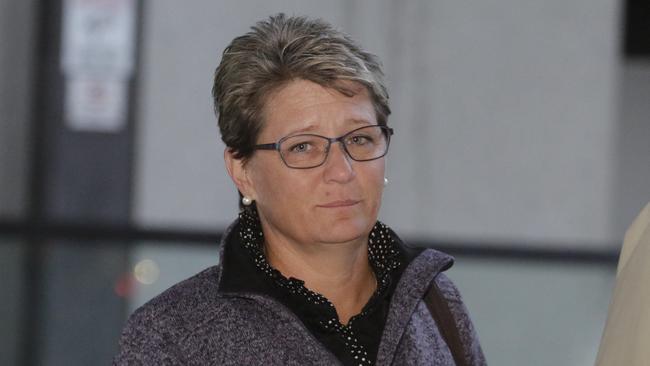
In a horrific case study riddled with conflicts of interest, grazier Wendy Brauer of Theodore, Queensland, told the financial services royal commission she trusted the local Rabobank manager and wrongly believed he was her friend.
10.14am: James concedes conduct in Brauer case breached code
We’re back on the credit department’s concerns and whether these concerns were communicated to the Brauers. The credit department specifically said:
“while on the surface the loan service ratio (LSR) is okay for this request, gearing is high and serviceability is very hard to get a grip on … From now until 2012 this request doesn’t work. And most of the assessment between now and 2013 is hypothetical. A lot can change between now and then.”
Should they have been told that, Mr James? I believe so, he says.
You came to understand it was not a serviceable loan? Ms Orr asks. “In the context it was submitted, no,” he says. He says on the calculations he did it could not be serviced.
He concedes the bank’s actions fell below community standards and expectations and were unfair to the Brauers and it may have also been in breach of the code and may be classed as misconduct. “If I read the code to the letter, I believe it is [misconduct]”, he admits.
10.05am: Mr James says he altered his view after submission of statement
Ms Orr and Mr James are now debating whether the Brauers would have had the funds available to restock the properties on their return without funding from the bank.

Mr James says he can’t confirm but says he agrees that may be an interpretation. But in his original statement he disputed that fact. He says the continued to reflect and consult after he had submitted his statement and his understanding grew after speaking to those people.
10.03am: Orr follows the Rabobank email chain
Within the email trail from the bank manager to the Brauers at the time, Ms Orr centres on a question from the manager asking how easy it would be for them to offload their US property.
In her reply Mrs Brauer says there shouldn’t be any trouble selling it. She estimates a sale price of $220,000-$250,000.
There is then an email chain between the bank manager and Mr Gray, from the credit department, where he details the likely sale price of the US home, and also admits he may have underestimated the cost of the number of bulls required when the Brauers return to Australia. He then detailed to the credit department the leases on Kia-Ora and Jamberoo.
The bank manager then writes back to the Brauers to say there had been a bit of back and forth with Sydney (the credit department) but it looked like they would get approval for the loan. He then told them they would be provided with a facility of $3.7m now rather than the $4.2m they were seeking and in March 2011 they would be provided with extra funds to purchase cattle when they returned to Australia.
9.52am: Email in focus as Rabobank manager grilled
Today’s hearing has just started and Senior Counsel Assisting Rowena Orr QC is getting into it with Rabobank’s regional manager for southern Queensland and northern NSW, Bradley James.

We left off yesterday with Rabobank’s credit department questioning a number of assumptions made by the Brauers’ bank manager in relation to the credit submission he had completed for their loan.
An email sent by the bank manager to the Brauers that same day mentioned nothing about the credit department’s main concerns regarding their loan
Was that appropriate, Ms Orr asks Mr James. No, he replies.
9.48am: Bankwest to follow Rabobank in stand
Day 4 of Royal Comm bank misconduct hearings into farm finance starts. @RabobankAU in the hot seat. @Bankwest to come. @australian @aus_business #bankinginquiry #bankingRC
— Sue Neales (@BushReporter) June 27, 2018
9.45am: Day four of hearings kicks off
Welcome to day four of the rural lending hearings at the fourth round of the financial services royal commission.
Rabobank’s Bradley James is still in the hot seat over the bank’s lending activities to Queensland farmers the Brauers.
9.26am: Rabobank remains in the hot seat on day four
Yesterday we heard how Rabobank had set its local manager a target of writing $15 million of new loans per year and allowed bank managers to value the rural properties they were writing loans against.
Wendy Brauer outlined to the royal commission how Rabobank in 2009 gave the Brauers a $3m lending facility to buy a large slice of a $4m property, Jamberoo, along with the promise of an extra $300,000 to buy breeding cows to stock the new bush block when needed.
Within a year Rabobank told them they would only be allowed to access the promised $300,000 if they sold a property and then repaid $3m of debt by 2013.
After Mr James finishes up giving evidence, the next witness to be called will be case study Mel Ruddy, followed by CBA’s Sinead Taylor.



To join the conversation, please log in. Don't have an account? Register
Join the conversation, you are commenting as Logout